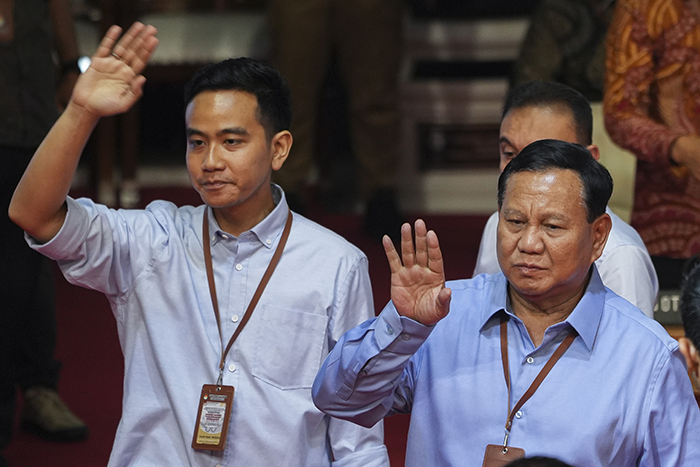Analyses / Asia-Pacific
23 February 2024
Presidential Election in Indonesia: A Political Continuity?

On February 14 2024, 204 million Indonesians were called to the polls for presidential and legislative elections. These elections were eagerly awaited in the archipelago and in South-East Asia, at a time when Indonesian President Joko Widodo was unable to stand for re-election at the end of his two terms in office.
What is the assessment of President Joko Widodo’s term of office after these elections?
The assessment of Joko Widodo’s term, a president who was first considered an outsider when he came to power in 2014, could be considered as very positive after ten years in office. In a poll conducted in December 2023, 76% of Indonesian people claimed to be satisfied with the policies implemented by its government[1].
The Indonesian president’s popularity is largely due to a positive economic record. Since 2014, the country has benefit from solid annual economic growth, reaching 5%, with the exception of 2020 and 2021 due to the effects of restrictions linked to the Covid-19 pandemic. Jakarta has also managed to keep inflation down to 3.6% in 2023 – a rate that has remained slightly below the average for the Association of Southeast Asian Nations (ASEAN) countries for the past two years – as well as achieving a slight drop in its unemployment rate, from 5.9% in 2014 to 5.3% in 2023. Over the same period, living standards in the archipelago have also generally improved, with GDP per capita rising from $3,500 to over $5,100. However, this finding needs to be qualified in view of the persistent economic inequalities between the islands, with a higher standard of living in the west of the archipelago than in the east and south-east. Moreover, 11% of the population still lives below the poverty line.
This economic record is underpinned by a successful development policy implemented by Joko Widodo over the last ten years. This is based not only on the development of infrastructure across the archipelago (including the project to move the Indonesian capital from Jakarta to Nusantara), but also on a strategy of exploiting raw materials. A strategy from which the country has profited, notably as the world’s leading producer of nickel. In 2020, Joko Widodo banned the export of raw nickel, a component needed to make batteries for electric vehicles, in order to give the country a place in the global supply chain and encourage foreign carmakers to invest in setting up battery production plants in Indonesia.
On the political front, the Indonesian President was praised by the United Nations for taking the first step towards acknowledging crimes committed by the State before his term of office. His statements included mention of the massacres against communists, Chinese and left-wing intellectuals in 1965 and 1966, which resulted in 500,000 deaths, the repression of demonstrations in 1998 and human rights violations committed in the province of Aceh, in East Timor and in Indonesian and West Papua. This statement has left NGOs and human rights activists sceptical, given the resurgence of conflict in Papua in 2019, which has led to violent clashes between Papuans and the Indonesian authorities and the death of 32 people. The Indonesian government reorganised the region into four provinces (Papua Barat, Papua Salatan, Papua Tengah and Papua Pengunungan) in 2022 to ensure better governance and development.
In addition to these observations, there are signs of a weakening of democracy at the end of Joko Widodo’s mandate, as some observers have pointed out, particularly during the presidential campaign[2].
The elections outcomes seem to herald a policy in line with the one of the outgoing president
On February 14 this year, candidate Prabowo Subianto and his running mate Gibran Rakabuming Raka unsurprisingly won the presidential election with 58% of the vote[3], a victory which is currently presumed but which should only be officially confirmed in the coming weeks. Although the candidate’s victory seemed fairly certain, there was still some doubt as to his ability to win in the first round. Joko Widodo’s former opponent in the two previous elections, and current Minister of Defence, will succeed the outgoing President in October. His candidacy has also taken the archipelago back to the darkest hours of its history, since Prabowo Subianto is also the former son-in-law of the dictator Soeharto (1967-1998) and was accused of human rights violations when he was commander of the Indonesian army’s special forces (Kopassus then Kostrad from 1976 to 1998).
How then can the candidate’s victory be explained? He certainly managed to run a very active campaign on TikTok aimed at young people, who make up a significant proportion of the Indonesian electorate[4], some of whom had little or no experience of the Soeharto regime, enabling him to take off his former general’s hat and put on that of a ‘grandfather’. But it was probably Joko Widodo’s support for his campaign that was the main factor in his victory. His running mate Gibran Rakabuming Raka was none other than the son of the outgoing president, and this enabled Prabowo to benefit from the popularity enjoyed by the man more commonly known as ‘Jokowi’. With this victory, President Joko Widodo has secured his political legacy within a coalition whose plans appear to be in line with the continuity of his two terms in office. It remains to be seen how much room for manoeuvre the future president will have. His coalition failed to win a majority of seats in the People’s Representative Council (Dewan Perwakilan Rakyat) following the legislative elections. The Indonesian Democratic Party of Struggle (PDIP), which came out on top, has for the time being announced that it is joining the opposition.
Elections deserving special attention in view of active Indonesian diplomacy
During his term in office, Joko Widodo advocated a foreign policy that was ‘free, active and in the service of national interests’. Indonesia has been active diplomatically in recent years, chairing the G20 in 2022 and ASEAN in 2023, and being invited to the G7 (2022 and 2023) and BRICS (2023) summits. The principles of this policy are also reflected in the archipelago’s stance on international conflicts.
With regard to the conflict in Gaza, Jakarta, which has officially rejected a normalisation of relations with Tel Aviv, has reiterated its support for the Palestinian cause. As the world’s largest Muslim country, Indonesia has always been attentive to violence committed against Muslim minorities. The Palestinian question is all the more sensitive for the country as it was already on the agenda of discussions at the Bandung conference in 1955.
Indonesia’s foreign policy stance on the Russian-Ukrainian conflict is also noteworthy. Jakarta condemned Russia’s invasion of Ukraine when the United Nations General Assembly passed resolution ES11/1 on 2 March 2022. Joko Widodo was the first Asian leader to visit Kiev and meet both Volodymyr Zelensky and Vladimir Putin. Finally, the archipelago showed its willingness to play an intermediary role in the conflict when Defence Minister Prabowo Subianto submitted a peace plan. This suggested the establishment of a demilitarised zone 15 kilometres either side of the front line, which could have been controlled by United Nations peacekeeping forces. The plan also provided for the organisation of a referendum to determine locally whether the inhabitants of the disputed areas wanted to belong to one side or the other. However, this proposal was rejected by Kiev.
In addition, since its independence and the Bandung conference which gave birth to the ‘non-aligned movement’ in 1955, Indonesia has pursued its position of non-alignment, which might now be better described as multi-alignment, on the international stage. Jakarta’s objective in this respect is to prioritise its economic interests and promote multilateralism.
The pursuit of this principle is expressed in particular by the archipelago’s decision to maintain its neutrality with regard to the Sino-American rivalry. While Indonesia turns to the United States for security matters, it regrets Washington’s lack of interest in South-East Asia. US President Joe Biden’s decision to visit Vietnam rather than Indonesia after attending the ASEAN summit in 2023 (which Jakarta was chairing) was a source of disappointment. Indonesia also has close economic ties with China, its biggest trading partner. Beijing has contributed to major investments in the archipelago, as demonstrated by the high-speed rail link between Bandung and Jakarta. China is also more diplomatically committed to Indonesia than its American rival, sending a government representative every year. Nonetheless, the country remains wary of Beijing on the security front, as its claims in the China Sea could lead to tensions with Indonesia, which advocates stability in the region. In the South China Sea, under the United Nations Convention on the Law of the Sea, Jakarta has sovereignty over the Natuna islands and the surrounding 370km economic zone (EEZ). However, part of these waters is claimed by Beijing, which bases its claims on the ‘ten-dash line’. This territorial disagreement has been at the root of several episodes of tension between the two countries, notably over the presence of Chinese fishing vessels in the Indonesian EEZ.
Indonesia’s position as a backwater in the Sino-American rivalry was further illustrated when President Joko Widodo announced that he had not submitted a letter of interest for the archipelago’s potential membership of the BRICS in August 2023. Widely regarded as a power of the ‘Global South’, Jakarta said it wanted to assess the positive and negative consequences of such a move, and clearly did not want to send the wrong message to Western countries by taking a decision it interpreted as siding with China.
In the aftermath of the presidential election, Prabowo Subianto seems intent on maintaining a certain continuity in foreign policy, even if this could take on a more nationalistic accent, and be marked by a more pronounced interest in defence and security issues.
_____________________
[1] Based on a poll conducted from 3 to 5 December 2023. Lembaga Survei Indonesia, Rilis LSI 10 Desember 2023, December 10 2023: 14.
[2] The accession of Joko Widodo’s eldest son, Gibran Rakabuming Raka, aged 36, to the vice-presidential candidacy is said to have been the subject of interference by the president in the presidential campaign. In October 2023, the Constitutional Court – headed by Joko Widodo’s brother-in-law Anwar Usman – granted eligibility to candidates below the legal minimum age (set at 40 by Indonesia’s 2017 electoral law) to run for the Indonesian presidency or vice-presidency if they had already held significant regional elective office.
[3] According to the vote count carried out by the Centre for Strategic and International Studies (CSIS).
[4] 52% of the Indonesian population is between 18 and 39 years old, according to the British Council.
Translated by Deepl

